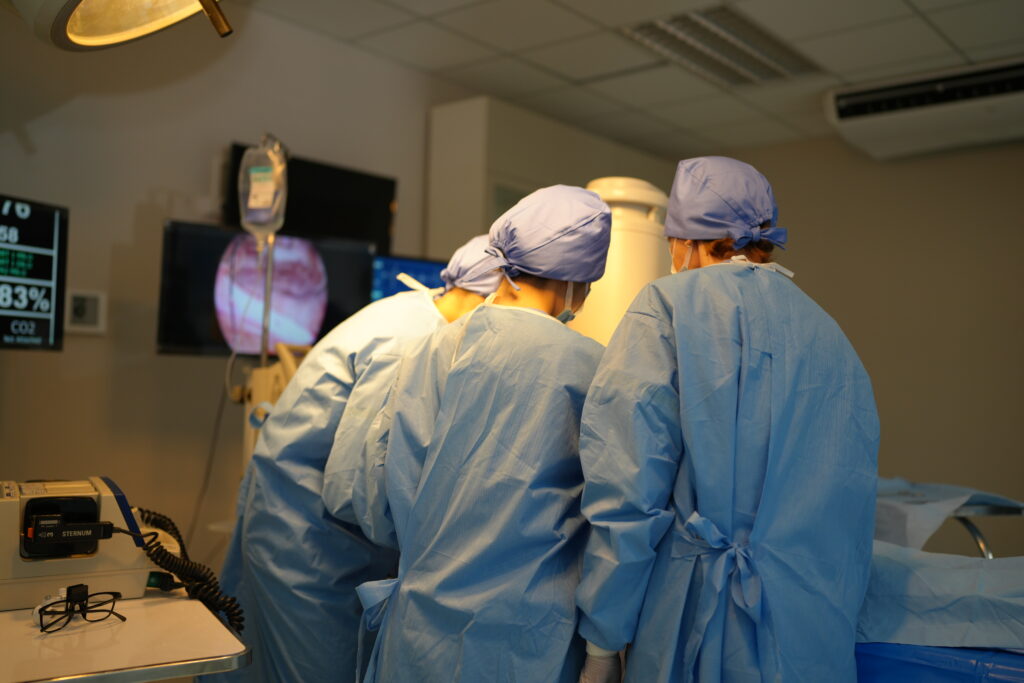- info@themedicity.com
- +91 8686-58-2020
- +91 9355-696-696
- Locations - Gurugram, India I Dubai, UAE
Fellowship in GI Endoscopy in India at The Medicity
Get Schedule course

Orientation to Endoscopic Instruments and Accessories
Advance your expertise with our Fellowship in GI Endoscopy in India at The Medicity. Our upper GI endoscopy training begins with an extensive orientation on the instruments and accessories essential for endoscopic procedures. Gain practical experience with various endoscopes, including gastroscopes and colonoscopes, and become proficient in using vital accessories like biopsy forceps, snares, and injection needles. Our endoscopy training courses in India ensure you grasp the functions and proper handling of these tools, ensuring effective and safe practices. Enroll in our endoscopy fellowship for surgeons and join our Upper and Lower GI Endoscopy course to enhance your skills and knowledge.
Endoscopic Cleaning and Disinfection.
Ensuring patient safety and maintaining high standards of hygiene are paramount. Trainees are taught the meticulous process of cleaning and disinfecting endoscopic equipment. This involves thorough manual cleaning to remove biological debris, followed by high-level disinfection using automated reprocessors. Adhering to these protocols helps prevent cross-contamination and infection.
Basic Upper GI Endoscopic Technique
Mastering the basic upper GI endoscopic technique is a foundational skill. Trainees learn to navigate the esophagus, stomach, and duodenum using a flexible endoscope. Techniques for optimal visualization, handling the endoscope with precision, and safely maneuvering through the upper GI tract are emphasized.
Preparation and Premedication Methods for Patients
Proper patient preparation and premedication are essential for a successful endoscopic procedure. Trainees are instructed on fasting protocols, assessing patient history, and administering premedications to ensure patient comfort and cooperation. This preparation minimizes complications and enhances the overall effectiveness of the procedure.
Indications, Contraindications, and Complications of Upper GI Endoscopy
Understanding the indications and contraindications for upper GI endoscopy is critical. Trainees are taught to identify when an upper GI endoscopy is warranted, such as in cases of persistent upper abdominal pain, unexplained weight loss, or suspected upper GI bleeding. Recognizing contraindications, such as severe cardiac or respiratory conditions, is equally important to avoid unnecessary risks. Trainees also learn to anticipate and manage potential complications, including perforation and bleeding.
Tissue Biopsy and Handling
Performing tissue biopsies during endoscopy is a vital skill. Trainees learn the correct techniques for obtaining tissue samples, handling them to prevent contamination, and ensuring proper labeling for pathology. Accurate biopsy techniques are essential for diagnosing various GI conditions.
Interpretation of Upper GI Endoscopic Findings
Interpreting the findings of an upper GI endoscopy requires a keen eye and detailed knowledge. Trainees are trained to recognize normal anatomical structures, identify pathological changes such as ulcers, tumors, or varices, and differentiate between benign and malignant lesions. Accurate interpretation guides appropriate clinical management.
Technique for Endoscopic Hemostasis
Managing bleeding during an endoscopic procedure is a critical skill. Trainees are instructed in various hemostasis techniques, including the use of clips, thermal coagulation, and injection therapy. Mastery of these techniques is essential for controlling GI bleeding effectively.
Overcoming Upper GI Endoscopic Difficulties
Endoscopic procedures can present various challenges, such as difficult anatomy or patient-related issues. Trainees learn strategies to overcome these difficulties, including advanced maneuvering techniques and the use of auxiliary equipment. Problem-solving skills are honed to ensure successful outcomes in complex cases.
Basic Lower GI Endoscopic Technique
The basic technique for lower GI endoscopy involves navigating the colon with a colonoscope. Trainees are taught to advance the scope safely, visualize the colonic mucosa, and perform therapeutic interventions when necessary. Emphasis is placed on minimizing patient discomfort and ensuring thorough examination.
Preparation and Premedication Methods for Lower GI Endoscopy
Similar to upper GI endoscopy, proper preparation and premedication are essential for lower GI procedures. Trainees learn bowel preparation protocols, patient assessment, and appropriate premedication to facilitate a smooth and effective endoscopic examination.
Indications, Contraindications, and Complications of Lower GI Endoscopy
Trainees are educated on the indications for lower GI endoscopy, such as screening for colorectal cancer, evaluating unexplained lower abdominal pain, and investigating chronic diarrhea. Contraindications, including severe colitis or recent myocardial infarction, are also discussed. Potential complications like perforation, bleeding, and infection are covered, along with their management.
Tissue Biopsy and Handling in Lower GI Endoscopy
Lower GI endoscopy often involves tissue biopsies to diagnose conditions like inflammatory bowel disease or colorectal cancer. Trainees learn the techniques for obtaining and handling biopsies to ensure diagnostic accuracy and prevent sample degradation.
Interpretation of Lower GI Endoscopic Findings
Accurate interpretation of lower GI endoscopic findings is crucial for appropriate patient management. Trainees are trained to identify normal colonic anatomy, recognize pathological findings such as polyps, diverticula, or inflammatory changes, and distinguish between benign and malignant lesions.
Technique for Endoscopic Hemostasis in Lower GI Endoscopy
Controlling bleeding during lower GI endoscopy is a vital skill. Trainees learn hemostasis techniques, including mechanical methods like clipping, thermal coagulation, and injection therapy, to effectively manage GI bleeding.
Overcoming Lower GI Endoscopic Difficulties
Lower GI endoscopy can present various challenges, such as looping of the colonoscope or poor bowel preparation. Trainees are taught strategies to overcome these difficulties, including advanced scope handling techniques and the use of auxiliary devices. Problem-solving skills are emphasized to ensure successful outcomes in complex cases.
At The Medicity, comprehensive GI endoscopy training equips healthcare professionals with the knowledge and skills needed to perform endoscopic procedures safely and effectively. Through hands-on training and expert guidance, trainees are prepared to meet the challenges of clinical practice and provide high-quality care to their patients.

